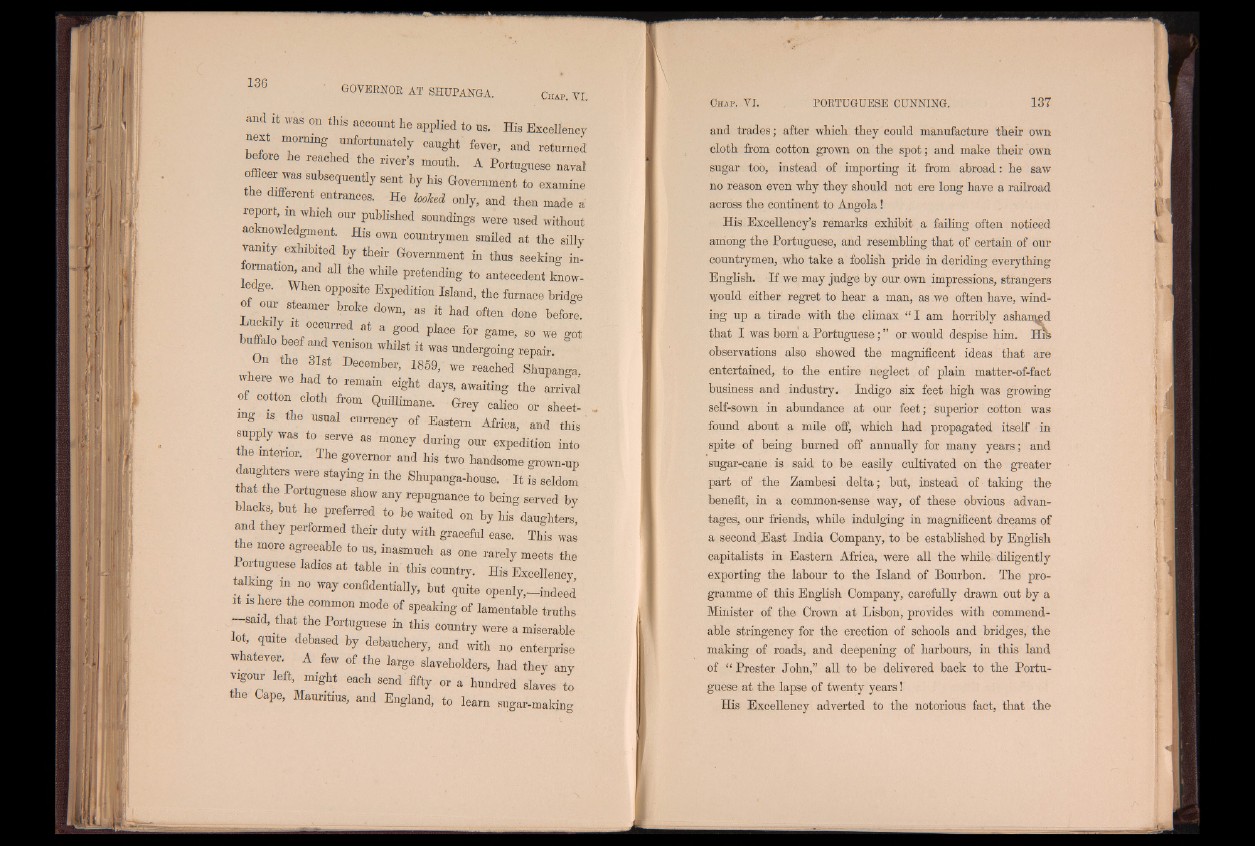
and it was on this account he applied to ns. His Excellency
next morning unfortunately caught fever, and returned
before he reached the river’s mouth. A Portuguese naval
officer was subsequently sent by his Government to examine
the different entrances. He loolced only, and then made a
report, m which our published soundings were used without
acknowledgment. His own countrymen smiled at the silly
vanity^ exhibited by their Government in thus seeking information,
and all the while pretending to antecedent know-
e ge. When opposite Expedition Island, the furnace bridge
o our steamer broke down, as it had often done before.
buff^b^/T^- F buffalo beef and vemson w" hgil°s°t dit ^was u nfd°re rggoaimnge’ re8p0air.
On the 31st December, 1859, we reached Shupanga,
where we had to remain eight days, awaiting the arrival
of cotton cloth from Quillimane. Grey calico or sheeting
is the usual currency of Eastern Africa, and this
supply was to serve as money during our expedition into
the interior. The governor and his two handsome grown-up
daughters were staying in the Shupanga-house. I t is seldom
at the Portuguese show any repugnance to being served by
blacks, but he preferred to be waited on by his daughters,
and they performed their duty with graceful ease. This was
the more agreeable to us, inasmuch as one rarely meets the
Portuguese ladies at table in this country. His Excellency
talknig m no way confidentially, but quite openly,-indeed
it is here the common mode of speaking of lamentable truths
said, that the Portuguese in this country were a miserable
lot, quite debased by debauchery, and with no enterprise
whatever. A few of the large slaveholders, had they any
vigour left, might each send fifty or a hundred slaves to
the Cape, Mauritius, and England, to learn sugar-making
and trades; after which they could manufacture their own
cloth from cotton grown on the spot; and make their own
sugar too, instead of importing it from abroad: he saw
no reason even why they should not ere long have a railroad
across the continent to Angola!
His Excellency’s remarks exhibit a failing often noticed
among the Portuguese, and resembling that of certain of our
countrymen, who take a foolish pride in deriding everything
English. If we may judge by our own impressions, strangers
would either regret to hear a man, as we often have, winding
up a tirade with the climax “ I am horribly ashanmd
that I was bom' a Portuguese; ” or would despise him. TTm
observations also showed the magnificent ideas that are
entertained, to the entire neglect of plain matter-of-fact
business and industry. Indigo six feet high was growing
self-sown in abundance at our feet; superior cotton was
found about a mile off, which had propagated itself in
spite of being burned off annually for many years; and
sugar-cane is said to be easily cultivated on the greater
part of the Zambesi delta; but, instead of -taking the
benefit, in a common-sense way, of these obvious advantages,
our friends, while indulging in magnificent dreams of
a second East India Company, to be established by English
capitalists in Eastern Africa, were all the while diligently
exporting the labour to the Island of Bourbon. The programme
of this English Company, carefully drawn out by a
Minister of the Crown at Lisbon, provides with commendable
stringency for the erection of schools and bridges, the
making of roads, and deepening of harbours, in this land
of “ Prester John,” all to be delivered back to the Portuguese
at the lapse of twenty years!
His Excellency adverted to the notorious fact, that the